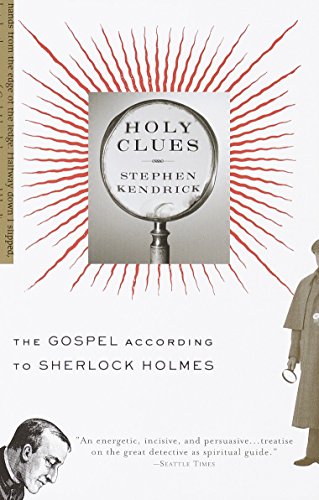All books / Book
Holy Clues: The Gospel According to Sherlock Holmes

| Full title: | Holy Clues: The Gospel According to Sherlock Holmes |
|---|---|
| ISBN: | 9780375703386 |
| ISBN 10: | 0375703381 |
| Authors: | Kendrick, Stephen |
| Publisher: | Vintage |
| Edition: | Illustrated |
| Num. pages: | 208 |
| Binding: | Paperback |
| Language: | en |
| Published on: | 2000 |
Read the reviews and/or buy it on Amazon.com
Synopsis
If God is the greatest mystery of them all, then why not, in pursuit of God, consult the greatest detective of them all? In this imaginative and surprisingly profound book, Stephen Kendrick reveals Sherlock Holmes as spiritual guide.
Drawing on the teachings of Christianity, Buddhism, and Judaism--as well as a host of thinkers as varied as Albert Einstein, Gandhi, and Vincent van Gogh--Kendrick explores the stories of Sherlock Holmes and finds remarkably prescient religious insights. He shows us the link between careful observation of clues and the Buddhist concept of "Bare Attention." He illuminates the parallel between the great sleuth's pursuit of justice and God's actions on the scene of the first murder, when Cain slew Abel. And in the detective's open, engaged mind, Kendrick finds a model for uniting the principles of science with a sincere spiritual quest. The result is a book of inspiration for the modern, skeptical searcher--and an entertaining work that sheds new light on the methods of the world's greatest detective.
Salon - Sean Elder
Few fictional characters have enjoyed the shelf life of Sherlock Holmes. Since Sir Arthur Conan Doyle introduced him to readers in 1887, the master logician of Baker Street has enjoyed an existence far beyond his original 60 stories. He has been reimagined and re-created in countless stories, plays, films and television programs -- as Holmes the cokehead (The Seven-Per-Cent Solution), Holmes the adolescent (Young Sherlock Holmes), even Holmes the incompetent (The Adventure of Sherlock Holmes' Smarter Brother). In Holy Clues: The Gospel According to Sherlock Holmes, Stephen Kendrick tries to pin another guise on the redoubtable Holmes: spiritual master. But as diverting as this volume is, the author's case seems rather circumstantial.
Assembling the spiritual wisdom of fictional characters is a rather tired gag in the book business that can be traced back to perennial bestseller The Tao of Pooh (1982). What makes Holmes such an unlikely subject for this kind of treatment is his strict adherence to logic and to the known world. "This agency stands flat-footed upon the ground, and there it must remain," he tells Watson in "The Sussex Vampire." "The world is big enough for us. No ghosts need apply." But Holmes' creator felt otherwise: He used the sale of his detective stories to pay for his pursuit of spiritualism -- even though Holmes looks, as one critic has noted, "like an antidote to the occult, an oasis of reliable, materialistic order. There are no spirit rappings on the walls of his house in Baker Street."
Doyle, Kendrick maintains, went New Age late in life; rather than let his extremely unpopular views drag his greatest creation down, he planted secret messages, using Holmes as a mouthpiece for his beliefs about God. The evidence he presents is at best scattershot, though he acquits himself well on deduction's place in the pursuit of spiritual matters. "This passion to comprehend the beginning of things is more than a pursuit of logic and reason," he writes. "It is a profoundly religious impulse, perhaps the most primal and powerful religious instinct there is." But there is a padded, fuzzy feeling to a lot of the book. Kendrick is a Unitarian minister, and much of Holy Clues reads like a stretched-out Sunday sermon. Though he includes some salient quotations from P.D. James and G.K. Chesterton, others -- from Einstein, Thoreau, Woody Allen -- are downright bizarre.
The search for spirituality in the mystery story is a well-mined vein, and Kendrick draws on some of the best literature extant. But in trying to make Holmes into Mr. Natural, he appears to be chasing a red herring. There is entertainment here, and he has some fresh insights -- for example, the relationship between Holmes' study of Buddhism (during the unaccounted-for years between "The Final Problem," when Doyle faked his detective's death, and "The Adventure of the Empty House," when he resurrected him) and the end of his cocaine habit. Kendrick appreciates Watson's humanizing influence on rather glacial Holmes, and the importance of their Bones-Spock relationship. But fuzzy thinking and repetitious writing hinder his case. As Holmes might say, "Cut out the poetry, Watson."